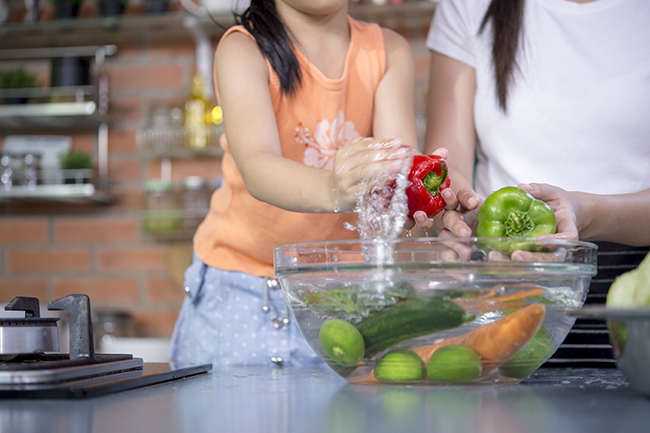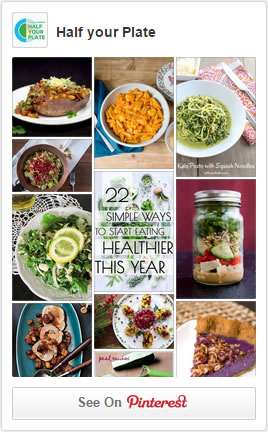Make the Most of Your Fruits and Veggies During the COVID-19 Pandemic
 By Jen Ong Tone MHSc RD, #HalfYourPlate Registered Dietitian
By Jen Ong Tone MHSc RD, #HalfYourPlate Registered Dietitian
While you’re staying at home more often than usual, it’s a good idea to have healthy foods on hand, and that includes fresh fruits and veggies. Fruits and veggies are packed with nutrients that contribute to your health and well-being, including a healthy immune system. Worried that your fresh fruits and veggies will go bad too quickly? Here are some tips to stretch your fruits and veggies until your next grocery store visit.
Tip #1: Purchase Fruits and Veggies with Both Short and Long Shelf Lives
Fruits and veggies with a short shelf life
Since fresh fruits and veggies eventually spoil, try eating the ones with a shorter shelf life within the first week following their purchase. This includes fruits and veggies like berries, leafy greens, broccoli, and tomatoes. If you don’t already do so, try making a weekly meal plan to help you plan out your meals and snacks for the week.
Fruits and veggies with a long shelf life
There are many fruits and veggies that can stay fresh for up to two weeks, and some even up to a month, when stored correctly. These are great to have on hand when you’re trying to limit your outings.
Fruits and veggies that may stay fresh for up to two weeks include:
- Cabbage
- Carrots
- Cauliflower
- Celery
- Kiwis
- Pomegranates
- Potatoes
- Rutabagas
- Squashes: Acorn, butternut, buttercup
Fruits and veggies that may stay fresh for up to a month include:
- Apples
- Beets (with tops removed)
- Citrus: Lemons, limes, oranges, grapefruit, tangerines)
- Garlic
- Onions
- Parsnips
Tip #2: Store Your Fruits and Veggies Properly
How should you store your produce?
Store your fruits and veggies separately in the refrigerator crisper, whenever possible. Some fruits, such as apples, ripe bananas, and melons release a natural gas called ethylene, which can cause some veggies to spoil quicker.
Where should you store your produce?
On the countertop? In the fridge? In the pantry? To keep your produce fresh and lasting longer, store it in the right place when you bring it home. Use this visual as a guide when unpacking your groceries.
Tip #3: Fruits and Veggies About to Go Bad? Use them in New Ways or Revive Them!
Brown bananas, wilted lettuce, limp carrots – we’ve all been in a position where our produce spoils at a faster rate than we can eat it. The good news is that most overripe fruits and veggies can be incorporated into tasty snacks or meals – some can even be revived!
What to do with overripe fruit?
Use them in:
- Baked goods – Muffins, breads, pancakes, crumbles, and scones lend well to overripe bananas, peaches, nectarines, and berries.
- Jams – Combine with chia seeds as a thickener for a healthier version.
- Smoothies and popsicles – Blend into your smoothies and popsicles for added sweetness.
- Salad dressings – Blend with olive oil, vinegar, and fresh herbs for a homemade dressing.
- Sauces – Cook with balsamic vinegar for a fun topping to yogurt, pancakes, and meat.
What to do with overripe veggies?
Use them in:
- Sauces – Tomatoes that are starting to go bad make the perfect pasta sauce.
- Soups – Soups are the perfect way to use up vegetables, from a hearty minestrone soup to a cream of veggie soup.
- Baked goods – Grated zucchini adds moisture to baked goods.
How can you revive your veggies?
Some veggies, like wilted lettuce and leafy greens, limp carrots, and limp celery, can be revived by placing in ice-cold water for 15 minutes. Leaves can be placed in a bowl of cold water, while carrots and celery can be placed upright in a cup filled with water. This will allow the water to penetrate through the cells of the veggies, bringing it back to life again!
Putting it All Together
Fresh fruits and veggies are an important part of a healthy diet. Plan your meals before going to the grocery store and invest in produce that has both a short and long shelf life. Store them properly at home and be creative with how you use them to avoid food waste. Keep in mind though, if it’s too far gone, throw it into the compost.


















